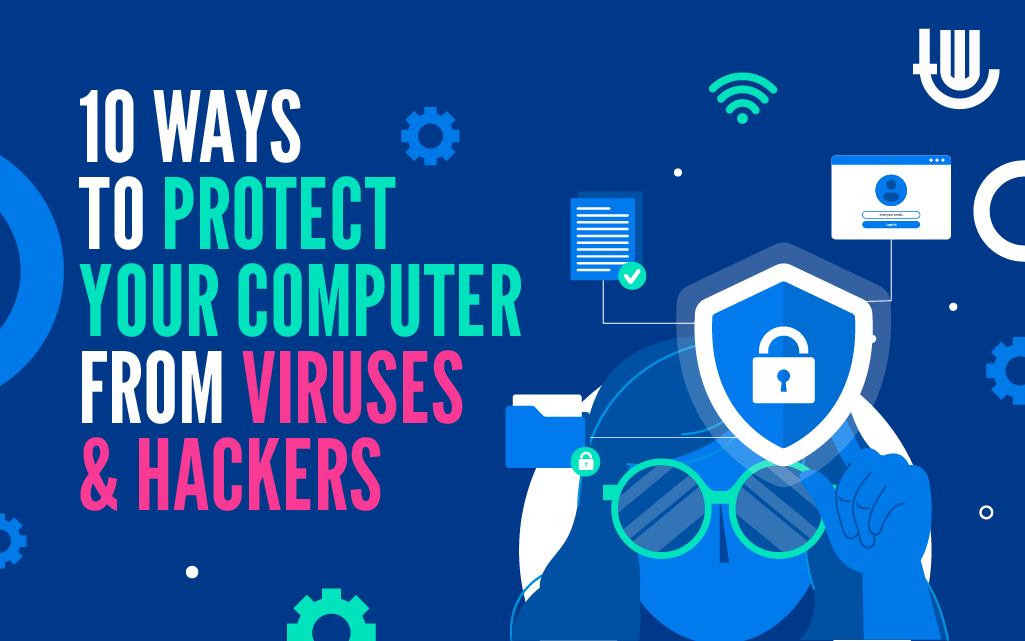We live in a world that progresses in terms of both, good and evil. It also applies to a space which connects individuals over the internet. Based on statistics, 33 billion accounts will be breached in 2023, which converts to 2328 per day, and 97 cybercrime victims per hour. These numbers are terrifying and a harsh awakening from the risks we are surrounded by. Thus, this article talks about ten ways to protect your computer from viruses and hackers. Read on to know more.
Ten Ways to Protect Your Computer From Viruses and Hackers

1. Passwords with MFA enabled.
The easiest way for a hacker to gain access and manipulate your account is when they have access to your passwords. Using the proper measures that can avoid a password breach are:
- Using a Password Manager.
- Implementing a firm password policy across all the accounts, such as using characters and alphanumeric combinations. The passwords shouldn’t be related to your personal life events, which can be easily brute-forced by gathering publicly available information about you.
- Implement a multi-factor authentication, which requires OTPs, codes, additional verification methods, along with a password.
- Not having a common password across all the accounts.
- Changing passwords frequently.
Related read: Password Safety: Do’s and Dont’s for Keeping Your Password Safe
2. Check whether you have been compromised.
While we can’t be proactive all the time about our accounts, we can always be on alert to see whether our accounts are compromised. This can be achieved by doing the following:
- Use your email and phone number on HaveIBeenPwned to check what all accounts were part of a data breach on the dark web.
- Keeping an eye on the latest news of cyberattacks on organizations or resetting your security settings once a company reports an incident.
3. Use premium Antivirus solutions.
A premium antivirus solution protects your computer from viruses, malware, and spyware. Most of them provide the highest level of protection and are cost-efficient to protect multiple devices under a single plan.
With various antivirus solutions in the market, such as Norton, Avast, Kaspersky, and McAfee, individuals can protect their computers from malware and virus sample signatures trying to infect their network and propagate to other devices.
4. Leave minimum cyber footprints online.
The best way to avoid being targeted by attackers is by being mindful of what we share online. Social media profiles are the hub for cybercriminals to profile their victims and learn more about them. Here are some steps to avoid leaking your personal information to the public:
- Keep your accounts private and only add the people you know.
- Keep documents such as travel tickets, certificates, health reports, and ID cards private.
- Share information only with your close and trustworthy group. Hackers can often reach out to your friends on social media to indirectly learn about you.
- Avoid mentioning your address, phone number, and email on social media in a way open to everyone on the internet.
5. Carefully inspect websites, calls, and emails.
Phishing and social engineering are the most common ways hackers attempt to get into a user’s account. They can try to obtain confidential data, access accounts, or deploy malware in the system through a single click.
- TrueCaller can flag spam numbers used in the past for fraud.
- Gmail highlights untrusted email senders. However, users can check for spelling and grammar errors and the email’s ‘too good to be true’ nature.
- A popular website can have multiple look-alikes with login pages to steal users’ passwords. This kind of fake is observed in banking to propagate financial theft.
- Individuals who come across such instances impersonating legitimate companies should report this for authorities to take proper action and protect others from falling into this trap.
6. Have all the security patches in place.
Keep all the computers and the software updated with the latest patches. Companies immediately release patches following a critical vulnerability discovered in their product used by the masses. Hackers spare no time and try to find all the new methods to exploit these issues even before the patch is released.
Keeping an eye out on the news related to tech can help you identify the vulnerability discovered in products you regularly use. Always try to find a patch or workaround shared by the vendor.
7. Run files and attachments via sandbox, virus total, etc.
Once an email containing an attachment is received that you suspect to be malicious, users can quickly perform a lookup by analyzing the sender. A simple Google Search on the email can provide details on whether it has been used in any campaign.
Prefer using an online sandboxing environment to analyze the file for any hidden malware or macros can also help.
8. Check for unnecessary permissions and red flags that your system has been compromised.
A quick check on personal devices can highlight the red flags caused by malware. System compromise for tablets, mobile phones, and laptops has typical symptoms of anomalies.
Excessive data usage, slow performance, unusual files popping up on the screen, noisy or disturbed calls, and battery issues are some signs of compromised devices.
9. Stay up to date with the latest tricks hackers can use.
Learn about the common social engineering tactics used by hackers, such as phishing scams or pretexting, and be cautious when receiving unsolicited emails or calls from unknown sources.
Twitter and news are the best sources to know the latest trends criminals use to target individuals.
10. Use a VPN while connecting to public WiFi.
It is best advised to avoid connecting to public WiFi. With new tools and attack methods, criminals can use techniques such as Man-In-The-Middle, sniffing, and evil twin attack to target users. Use a strong VPN that encrypts the data over the network.
Towards the conclusion
As we conclude on the topic of ‘10 ways to protect your computer from viruses and hackers’, we hope you liked the article and find it helpful.
By taking these steps, common people can better protect themselves from hackers and other online threats.

Author Bio: This article has been written by Rishika Desai, B.Tech Computer Engineering graduate with 9.57 CGPA from Vishwakarma Institute of Information Technology (VIIT), Pune. Currently works as Cyber Threat Researcher at CloudSEK. She is a good dancer, poet and a writer. Animal love engulfs her heart and content writing comprises her present. You can follow Rishika on Twitter at @ich_rish99.